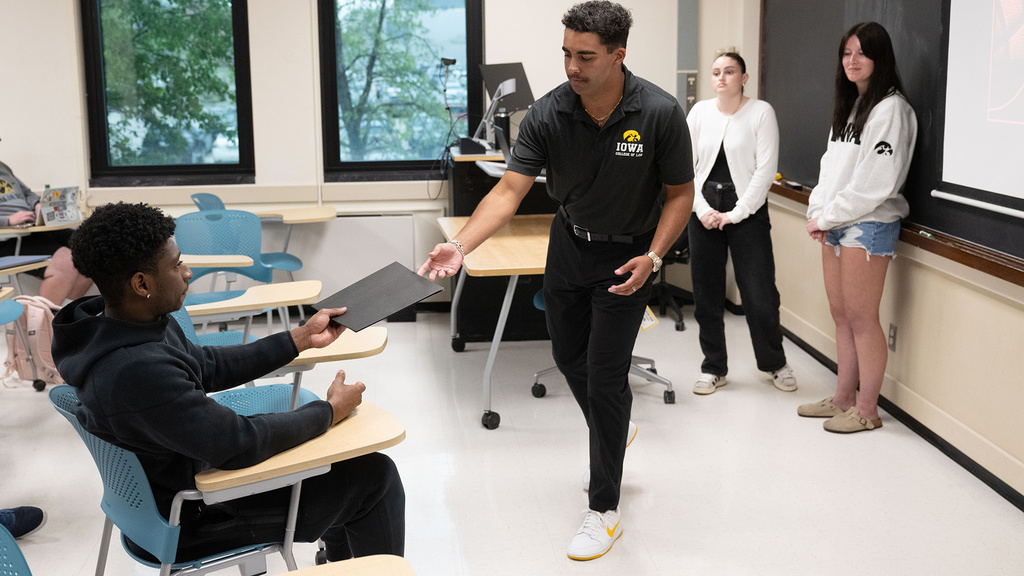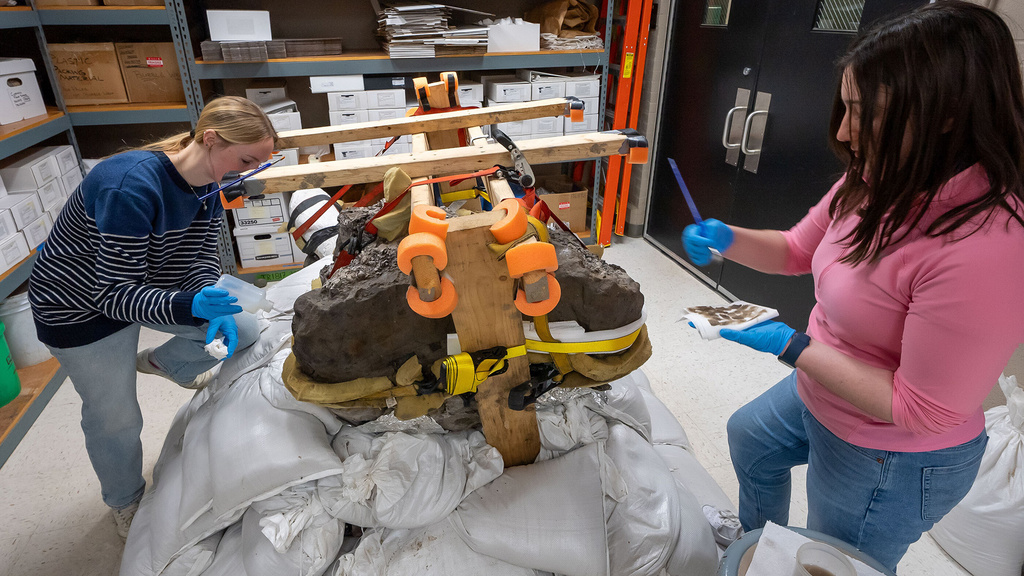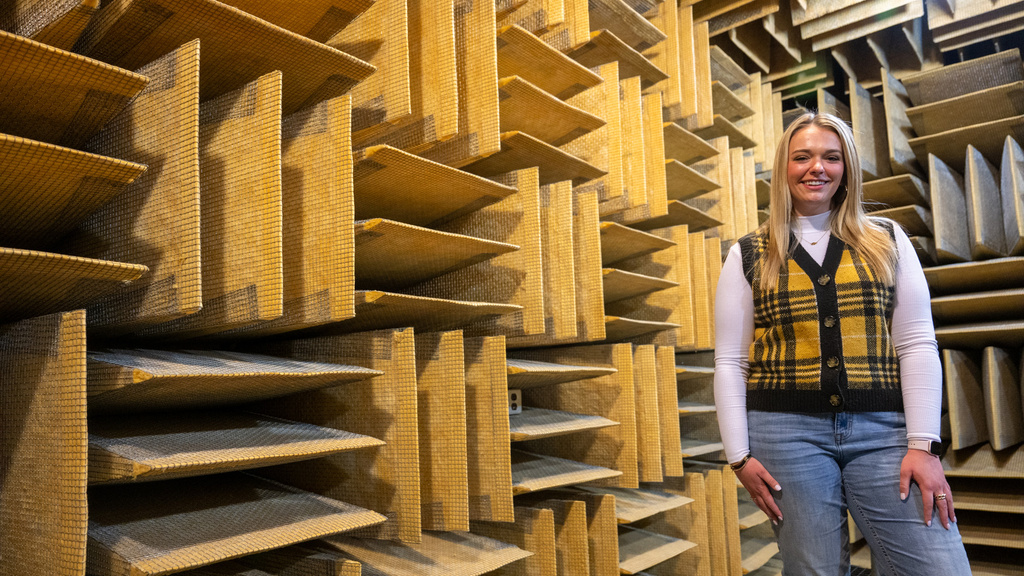Evita Woolsey came from California to the University of Iowa to pursue her interest in speech and hearing science. Through her involvement in an NIH-funded research project, the undergraduate is assessing children across the state and making connections with researchers on campus and beyond.
Story: Emily Nelson
Photography: Tim Schoon
Published: Oct. 26, 2021
Evita Woolsey never imagined how big a role research would play in her time at the University of Iowa—or that it would play a role at all.
“I was intimidated by research and looked at it as an aspect of those in the hard sciences,” says Woolsey, a fourth-year student from Encinitas, California, majoring in speech and hearing science and minoring in American Sign Language. “I didn’t realize that becoming involved in the Pediatric Audiology Lab would change my whole perspective on what I believed research was. It opened so many doors for me and also gave me the opportunity to do my own research project. It’s been such an unexpected part of my undergraduate experience.”
Woolsey has been an undergraduate research assistant for the Pediatric Audiology Lab and the Cochlear Implant Language Lab. This past summer, the Encinitas, California, native traveled around Iowa helping conduct assessments of children with hearing loss in a mobile clinic as part of a research project led by Elizabeth Walker, assistant professor in the University of Iowa Department of Communication Sciences and Disorders and a researcher in the Pediatric Audiology Lab.
Walker knows firsthand the impact that participating in research can have on a student’s education and how they approach their future careers.
She was working toward a PhD in speech and hearing science at the University of Iowa in 2008 when she joined the groundbreaking Outcomes of Children with Hearing Loss study team, which consisted of researchers at Iowa, Boys Town National Research Hospital in Omaha, and the University of North Carolina at Chapel Hill. More than a decade later, Walker has secured additional National Institutes of Health grants to continue following the original 300 children in the study who are hard of hearing through junior high and high school.
She also oversees and mentors University of Iowa students who work in the lab and its many research projects.
“They get to see the real-world impact of hearing loss,” Walker says. “As a clinical audiologist, you might see a family once a year. But we spend a lot of time with these families, so we really get to know them. That is something that students wouldn’t normally have the opportunity to do.”
While the researchers won’t have final results from the long-term hearing loss study for a while, Woolsey says she’s excited to see what happens.
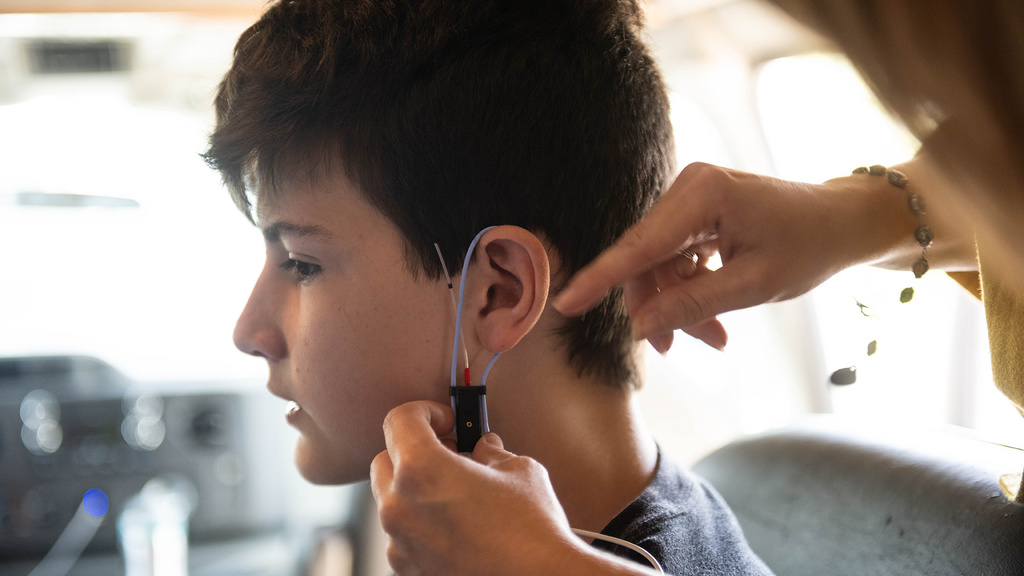
Groundbreaking research improving lives of children with hearing loss
University of Iowa researchers have been following 300 children with hearing loss for nearly 14 years, and their findings are changing lives, the field of audiology, and public policy.
“After visiting all the kids in different locations, it’s very obvious from what I’ve seen that children can be successful if they receive enough intervention and support, which is really impactful,” Woolsey says.
Along with being able to help write articles, give presentations, and attend conferences, Walker says this project also affords an unusual benefit to students.
“Because it involves multiple research centers, a lot of the students get to know people at Boys Town National Research Hospital in Omaha and the University of North Carolina at Chapel Hill,” Walker says. “So, they get to see what other centers are like and meet professionals they may not normally have had the chance to meet.”
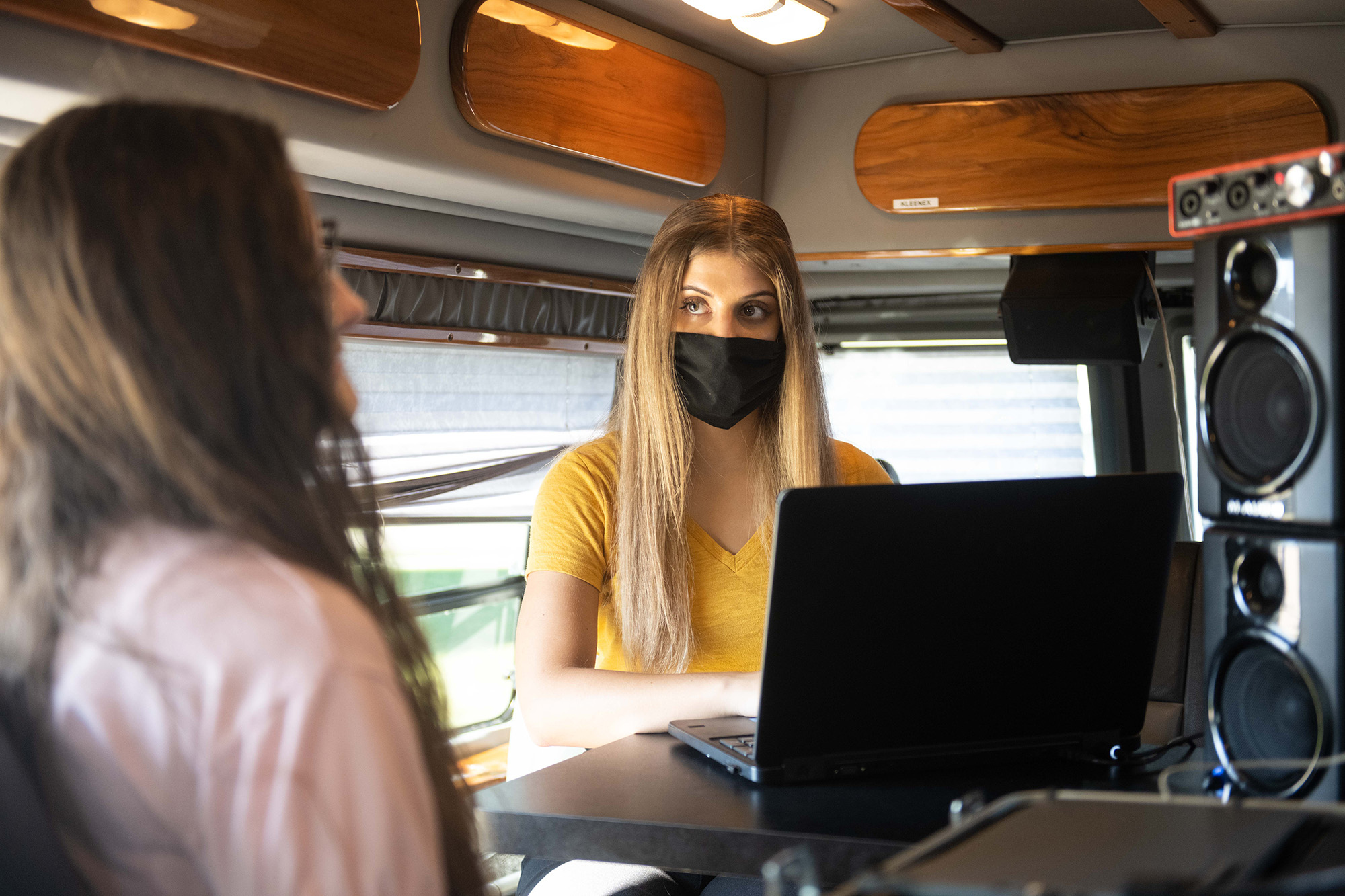
“I was intimidated by research and looked at it as an aspect of those in the hard sciences. I didn’t realize that becoming involved in the Pediatric Audiology Lab would change my whole perspective on what I believed research was. It opened so many doors for me and also gave me the opportunity to do my own research project. It’s been such an unexpected part of my undergraduate experience.”
Woolsey has experienced this firsthand.
“Doing research in communication sciences and disorders as well as in psychological and brain sciences has allowed me to form such amazing connections, not only with Dr. Walker, but with graduate students and the lab’s connections in North Carolina,” Woolsey says.
For her honors thesis, Woolsey is using an eye-tracking technique to study spoken and written word recognition in deaf adolescents who have cochlear implants. The goal is to uncover the mechanisms that may underlie delays with reading and spoken-language comprehension and provide additional information to educators who instruct deaf adolescents with cochlear implants.
Iowa appeared on Woolsey’s radar during high school in California because of her interest in speech and hearing science.
In her second year at Iowa, Woolsey reached out to Walker about potential research opportunities. Woolsey says while research may not play a central part of her future career, she sees value in having a background in it.
“Speech-language pathology is a clinical field and you need research to support how you work with patients,” Woolsey says. “With any healthcare field, it should be stressed that professionals gain some type of background in research because it will build such a closer tie with your patients. I love being a part of this background.”
Woolsey says she’s grateful for all the opportunities she’s had at Iowa, and for the support she’s received from faculty and graduate students.
“All of these amazing connections have made Iowa’s campus feel smaller and more like home,” Woolsey says. “One amazing aspect about Iowa is how supportive the faculty are toward their students. I feel comfortable going to Dr. Walker anytime I need guidance on anything, from grad school to where I want to live in the future.
Woolsey intends to pursue her master’s degree in speech-language pathology with the hope to work with children through aural rehabilitation. She also says she intends for more research to be in her future. And while speech pathology is her ultimate goal, her research experience has given her a newfound appreciation of audiology.
“The Pediatric Audiology Lab has provided great combined experience in the fields of audiology and speech pathology,” Woolsey says. “Most people favor one side in the major, but it turns out I love both areas. A huge part of that has been my involvement in the Pediatric Audiology Lab.”
Iowa Center for Research by Undergraduates
ICRU promotes undergraduate involvement in research and creative projects at the University of Iowa by facilitating the mentorship of students in research/creative work. It works with students, faculty, and staff from the arts, humanities, natural/physical sciences, social sciences, health and medicine, engineering, and business.
As an ambassador for the Iowa Center for Research by Undergraduates, Woolsey hopes to help fellow students find out how their academic interests can correspond with research opportunities at Iowa.
“You don’t have to be a hard-science person to be involved in research,” Woolsey says. “One of the main things that people are surprised about when they hear about these projects in speech and hearing sciences is how you can make a large impact in the field that doesn’t require wearing a lab coat.”

